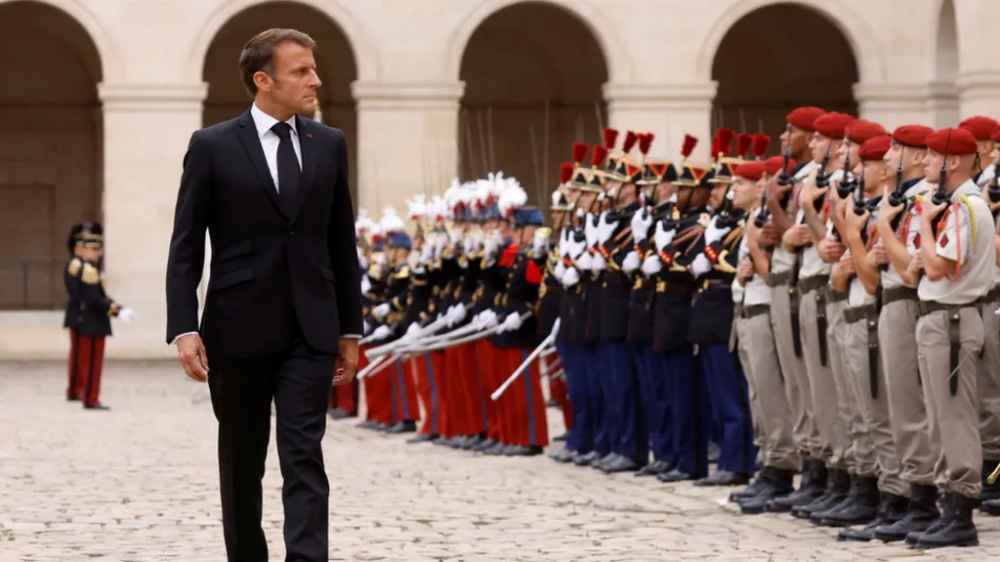Emmanuel Macron’s recent transformation from a conciliatory stance towards Russia to a more assertive and hawkish approach regarding the invasion of Ukraine has sparked intense debate and scrutiny both domestically and across Europe. This shift in Macron’s position, characterised by his newfound determination to resist Vladimir Putin’s aggression, raises questions about the authenticity of his convictions and the underlying political motivations behind his actions. In this article, we delve into the factors driving Macron’s pivot on the Ukraine crisis, its implications for European geopolitics, and the challenges he faces in rallying support for his stance.
Emmanuel Macron’s evolution from a dove to a hawk on Russia’s invasion of Ukraine represents a significant departure from his previous approach to diplomacy and international relations. As a proponent of dialogue and engagement with Russia, Macron initially sought to bridge the divide between East and West and foster cooperation on common challenges. However, the Kremlin’s brazen act of aggression against Ukraine shattered Macron’s illusions of constructive engagement and forced him to confront the harsh realities of Putin’s expansionist ambitions.
The catalysts for Macron’s pivot are manifold and reflect both external geopolitical dynamics and internal political considerations. On the international front, Russia’s aggressive actions, including its annexation of Crimea and support for separatist movements in eastern Ukraine, undermined Macron’s belief in the possibility of a peaceful resolution to the conflict. The escalation of hostilities, coupled with the Kremlin’s destabilizing activities in Europe, compelled Macron to reassess his approach and adopt a more confrontational stance towards Russia.
Macron’s pivot can be attributed to domestic political factors, including the upcoming European elections and the rise of right-wing populism in France. With the National Rally gaining momentum and posing a formidable challenge to Macron’s centrist agenda, he may see an opportunity to bolster his leadership credentials by taking a tough stance on Russia. By positioning himself as Europe’s resister-in-chief to Putin’s aggression, Macron seeks to draw a clear contrast between his leadership and the perceived ambivalence of his far-right opponents towards Moscow.
Implications for European Geopolitics: Macron’s pivot on Russia’s invasion of Ukraine has profound implications for European geopolitics and the future of EU-Russia relations. By aligning himself with countries like the Baltics and Poland, Macron aims to forge a united front against Russian aggression and reaffirm Europe’s commitment to collective security and solidarity. His newfound assertiveness signals a departure from the era of appeasement and calls for a more robust and principled response to Putin’s revisionist agenda.
Macron’s pivot has also exposed divisions within Europe, particularly between France and Germany, the traditional axis of European integration. While Macron advocates for a proactive approach to countering Russian aggression, Germany remains cautious and reluctant to escalate tensions with Moscow. The Franco-German discord underscores the challenges of achieving consensus on foreign policy issues within the EU and highlights the divergent interests and priorities of member states.
Macron’s pivot may face resistance domestically, as public opinion in France appears divided on the issue of sending Western troops to Ukraine. While Macron seeks to capitalize on his anti-appeaser stance to bolster his electoral prospects, he risks alienating segments of the population who oppose military intervention. The electoral subtext of Macron’s pivot, intended to expose the ambiguities of the far right’s position on Russia, may not yield the desired results, as support for the National Rally continues to strengthen.
Emmanuel Macron’s pivot on Russia’s invasion of Ukraine represents a bold and decisive shift in European geopolitics, with far-reaching implications for regional security and stability. As Macron navigates the complexities of European diplomacy, he faces the formidable challenge of rallying support for his hawkish stance on Russia and overcoming internal divisions within the EU. While Macron’s pivot may signal a newfound resolve to confront Russian aggression, its success hinges on his ability to translate rhetoric into action and mobilize consensus among European allies. As Europe grapples with the enduring threat posed by Putin’s Russia, Macron’s leadership will be put to the test, and the legacy of his pivot may shape the continent’s geopolitical landscape for years to come.
